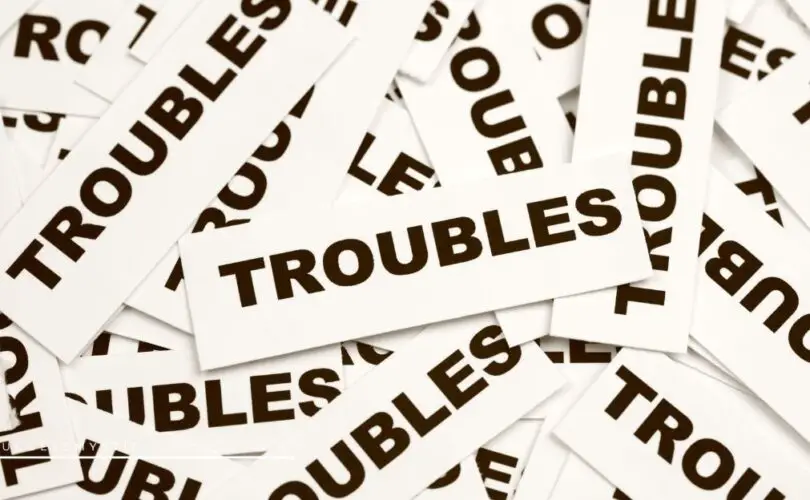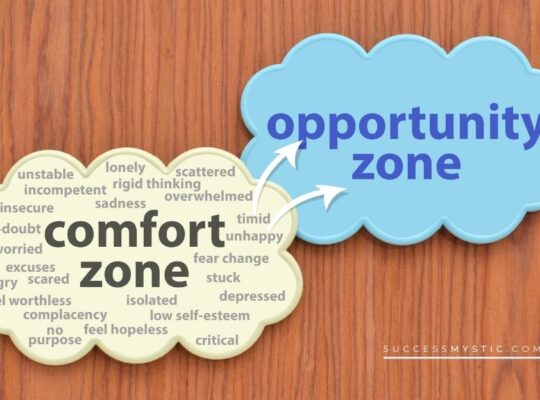In this article: Get rid of excess baggage and break free.
What Is Cluttering Your Mind?
Are you familiar with Marie Kondo? Before she swept the world into an organizing frenzy with her Netflix show she had a series of books. All of this revolves around her method of cleaning and organizing. The books were bestsellers, though not as popular as the show would be.
The point is everyone got caught up in organizing their material goods. It wasn’t just a straightforward spring clean; the method required an assessment. Does this shirt/letter/card/book spark joy? If it doesn’t, then you let it go, but not before you thank it for its service. There’s an almost spiritual aspect to the technique. Were you one of the many people who jumped on the bandwagon?
It’s interesting that people jumped on a cleaning frenzy trend, but people aren’t as quick to jump on cleaning out your soul.
What is cluttering your mind? What is holding you back and damaging your personal growth? What troubles keep you up at night and possess your attention in an unhealthy way? We all have worries and troubles, but have you ever stopped to ask whether it’s worth your energy?
Wasting Precious Energy On Things That Don’t Matter
We often put a lot of energy and time into things that don’t really matter. Or, more to the point, into things that we have no real control or influence over. We try to control external circumstances and the actions and behaviors of other people. Yet, how often do you pay real attention to your thoughts, behaviors, and actions? It’s madness. You can control you, but you get caught up trying to control everything else.
Think about this as an example. You recently completed a pitch trying to secure a new client. You worked really hard on compiling a presentation, you practiced your presentation repeatedly, researched the client, researched the subject, and spent laborious hours to put it all together in a convincing sales pitch.
These are all things you had control over. You control your input. Now that the pitch is complete, there’s nothing more you can do yet, you worry about how it went. There is no point worrying about your pitch because you cannot influence the outcome. You had your chance to exert your control, you did it with your pitch, now it’s in someone else’s hands and worry is a waste of your energy.
That’s just one example, but I think it’s a great one. How often do you find yourself worrying about all the things you cannot change? At least once a day, and that’s being kind. What it does is creates unnecessary stress on your mind and body. It’s standing between you and joy. How can you experience and enjoy the day if you’re busy worrying about all of these things you can’t control?
According to an article from the Huffington Post, around 85% of what we worry about never comes to fruition (ref.).
Moreover, if the expected outcome does happen around 80% of people said they handled it far better than they expected. You will be a healthier, happier person if you let go of those worries instead of stressing out about them.
The truth of the matter is that you don’t control most of what happens to you during this life.
If you resist this truth, you will find yourself attempting to micromanage everything. You don’t want to delegate, but you want to force people to change. Some people convince themselves if they get control over situations and people, then they can prevent anything bad from happening.
Other people recognize that they can’t stop the bad things, but they spend their energy and time worrying about the bad things. They worry about deadly diseases, they panic about natural disasters and allow those worries to occupy their time, energy, and focus. It doesn’t do them any good.
Do you waste a lot of time, energy, and focus worrying about the things you can’t control?
It’s important to recognize that your habits are chasing you. If you make a habit out of worrying about every little thing, you are painting yourself into a corner and making yourself powerless.
When you make yourself powerless, all of those troubles, fears, and worries have the power to overtake you. They pile up when you allow them to chase and overpower you. It’s difficult to climb out from under them when they pile up, isn’t it?
How can you get rid of those headaches and break free?
Breaking Free From Troubles
1| Accept & Thrive Through Uncertainty
Life is beautiful, even though it’s unpredictable. In fact, some of the beauty is found in the unpredictability of life. With the unknown comes opportunity and excitement. This is how you should see it if you want to get rid of the troubles that aren’t worth your energy.
Put your time and energy into the things you can control and work hard to achieve what you want. That is all you have power over, the world will have its say regardless. Remember, you can only control your input so, accept and thrive the uncertainty of life.
2| Lean On Friends
Friends are the greatest sounding boards. A good friend isn’t afraid to tell it like it is. You need someone like that in your corner. You need someone who will listen to you, correct you, and point out when your worries are unrealistic (or realistic).
Sometimes just talking to a friend is enough to take the weight off and help you recognize yourself how much time and energy you’re wasting on something you can’t control.
3| Be Mindful
Mindfulness is an excellent tool to help you focus your mind. Mindfulness meditation is all about focusing on the moment you are in and shutting everything else out. The focus is on your breath, purging your mind of everything else, and just enjoying what is.
This won’t get rid of your troubles forever, but it will improve your ability to focus on what matters. The more you practice mindfulness meditation, the better you will be at it and the easier it will be to dismiss troubles you can’t control.
4| Creative Distractions
If there is a trouble you can’t shake, consider pursuing a distraction. While this isn’t a great plan for long-term freedom from troubles, it will help you manage them as you start this process. An activity that allows you to fully immerse in it and shut everything else out is a good place to start. The activity you choose should completely absorb you so that quiet troubles and worrying thoughts shouldn’t creep in.
5| Designated Space & Time
If you want to take full control over your troubles and the other strategies aren’t working, then assign yourself a worry period. Assign a designated space and time to your worries. Grab a pen and paper, go to your worry spot at the right time and just write it all about. Empty your head, heart, and soul onto paper and just let those worries go.
6| A Helicopter View
Is there anything more frustrating than the friend who always says okay but look at the big picture. It’s endlessly annoying, but it’s true. By zooming out and taking a helicopter view of the big picture, you are changing your perspective.
It’s easy to obsess over your troubles when you’re zoomed in on it. Zoom out, float above the situation and look at the trouble on a larger scale. It’s much easier to see how unimportant those troubles are when you allow yourself to gain perspective.
Another great exercise is to imagine yourself in a week, in a month, in a year, in five years and ask how much influence that trouble has on your future self.
7| Work
Look at troubles and worry as a sign that you need to act. Often, worries and troubles spike when you have a deadline, when chores are building up or when something is looming. It’s time to act.
While stress management is wonderful, sometimes the only way to get hold of those troubles is by taking action. Know when the trouble is begging for completion and when it needs to be dismissed. More importantly, be prepared to do the work necessary to resolve the issue. If this is often a source of your troubles, then you might want to reassess your time management abilities.
8| Setting Limits
Often, our troubles stem from resistance. Our resistance to saying no when no is the only answer possible. Are your troubles due to your inability to set boundaries and protect them?
Limits are important in life, especially when it comes to managing stress. You will never get a handle on all of your troubles if you allow everyone else to monopolize your time and energy. Learn to say hard pass with feeling.
9| Prioritize
Is what troubles you coming from your unrealistic expectations and inability to prioritize? Do yourself a favor and have realistic expectations. If you schedule four hours of errands on top of three hours of tasks, and still expect to fit in four, hour-long meetings as well as your commute and relaxation, think again.
You’re just making everything worse. You’re going to fall behind and then buy more troubles than you had previously.
10| Postpone It
We suggested a designated time for worry. If there is a trouble plaguing you, postpone it. Give yourself a break from the mental wear and tear and deal with it later. It means you are allowing yourself to focus on what you need to right now, without completely dismissing this worry.
When the time comes, you can pick that trouble back up and work through it. Don’t just sit and worry about it when the time comes, though, do the actual work. Ask questions about where this trouble or worry came from and break it down until it’s small enough to dismiss.
11| Stop
If you’ve tried everything, but you still cannot shake this trouble, then try giving it a direct order. HALT! Who goes there? Sorry, it’s time to stop. If you can, look in the mirror and make eye contact as you verbalize your direct order. While this is an unusual method, it’s one just different enough to derail the troubling thoughts you’re having.
You can’t just leave it at that, you’re going to have to actively think positive thoughts to keep them at bay. Take yourself to your happy place and self-soothe. Speaking of happy places, it’s always good to create a detailed visual of what your happy place looks like. You can retreat there when necessary.
12| Focus
It’s easy enough to get lost in your head as you try to understand why you feel so strongly about each specific trouble. Don’t forget about the external world. While you can’t control it, sometimes paying more attention to it and what needs to be done is more effective than asking what you’re feeling. The question about what needs to be done encourages you to reframe that trouble.
13| Imagine the Worst
If you cannot stop yourself from imaging the worst, then just let your mind imagine the worst. The trick here is to take the line of thought to the extreme.
For example, your trouble right now is whether your interview went well enough to secure you a new job. Naturally, you’re thinking things like well, if they don’t hire me, I’m going to run out of money and if I run out of money then I’ll lose my house and then I’ll have to live with my parents. Everyone I know will talk about me behind my back and eventually I’ll end up homeless because there’s no way my parents won’t kick me out and once, I’m homeless I’ll struggle to feed myself and I’ll end up dead.
Let the absolute worst-case scenario play out in your mind. Once you’ve done this, you can recognize all of the points at which you have control and can create a plan to deal with those issues.
While the worst-case scenario rarely occurs, you still have control and influence at a variety of stages of the scenario you allowed to play out in your mind. When you let it play out this way you can recognize how ridiculous you’re being and what concern is reasonable in this situation. When you find a reasonable concern, you can find appropriate solutions.
14| Rehearse
It’s time to flip the script. Instead of picturing the worst case-scenario, try to rehearse success. This is particularly useful in situations where you’re borrowing trouble. As in, you have an interview coming, you have a presentation to do, you’re meeting someone new, you’re meeting your partner’s family. Instead of worrying and picturing the worst-case scenario, you can instead rehearse yourself successfully navigating these situations.
Of course, in the case of interviews and presentations, you have a lot of control over your performance. These situations are all about your input, the outcome is out of your hands, but control what you can, where you can, and learn to let go of what you can’t.
Anticipate success in these situations to increase your performance and the chance of success. It will boost your confidence and help you manage worry.
Gaining Control of Your Troubles
Finally, you can drill down into each of your worries individually. The advice above is general but helpful. If your troubles and worries are bigger, read on.
1| Determine Your Sphere of Control
When you are in the midst of worry, take a time out. This is your opportunity to look at your trouble and examine what control you have over it. You might not have control of the weather, you can’t stop a tornado from coming, but what you can do is prepare for the tornado.
Just like you cannot control the behavior of others, but you can control your reaction and response to them. Determine your sphere and control with each of your troubles. Why would you spend your time and energy anywhere but on what you can control?
2| Focus On Your Sphere of Influence
Now you have a better idea of what you can control in relation to a specific trouble or worry. Now it’s time to focus on your sphere of influence. You can influence situations and circumstances, you can even influence people, but what you cannot do is make things go your way.
You can provide your child with all of the tools necessary to achieve straight As, but you cannot make your child achieve straight As. You can plan the most incredible party the world has ever seen, but you cannot force everyone at that party to have the best time.
To increase your sphere of influence you have to focus on your behavior. You can set healthy boundaries, you can role model good behaviors, you can share opinions when you feel someone has gone off track, but you cannot fix other people.
3| Identify The Fear
This trouble you’re focused on and worrying about, what is it exactly that you’re afraid will happen? Have you predicted the worst-case scenario? Have you convinced yourself you are unable to deal with disappointment?
The worst-case scenario almost never happens and when it does, it’s rarely as catastrophic as imagined. Moreover, you are stronger than you believe you are. You might be thinking something along the lines of, “but if I lose my job this will happen.” Instead, you have to ask what you would do if you did lose your job. You can acknowledge the worst-case scenario and spend your energy into creating a plan for it.
4| Problem-Solving & Pondering
Do you know what will never be helpful? Replaying situations, replaying conversations, imagining the worst-case scenario. Lather, rinse, repeat. This isn’t helpful.
Pondering and ruminating on these things won’t help you, it’s amping up your worry and making all of those troubles seem so much worse. Do you know what will help? Problem-solving. Ask whether your current line of thinking is productive. If the answer is no, shift your thinking and start looking at solutions.
5| Build a Plan
Learning how to manage your stress is one of the best choices you can make for your health and happiness. You can limit your stress levels by getting a good night’s sleep, eating well, and exercising regularly. Those are base-level habits to manage your stress levels.
It’s important that you make time to deal with stress. Meditation, hobbies, social situations are all excellent ways to manage stress. When you get all of these things right, you will notice that you are much better prepared to deal with the troubles you’re obsessing over.
6| Healthy Affirmations
Find or make up a phrase that will encourage you to take action. Find or make up a phrase that will help calm you down. When you catch yourself struggling with your troubles and worries, a healthy affirmation can inspire you and more importantly, correct your course.
It’s an excellent way to snap you out of the trap of falling into your troubles again. It’s all about focusing on what you can control and letting go of the rest.
Final Thoughts
It’s important to remember that worry is normal. Humans worry it’s natural. Don’t ever beat yourself up when you catch yourself worrying. However, dwelling on your troubles and holding onto headaches is going to reduce your positive emotions and increase your stress levels.
It would behoove you to gain control over what you do control and learn to just let go of the rest. If you can change it, then take action. If you can influence it, then do your piece. If you can’t do either, pay your respects and release those troubles back into the ether.
So, is what troubles you worth your energy or is it time to get rid of those headaches and break free?







